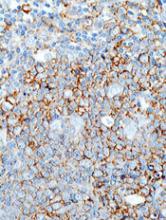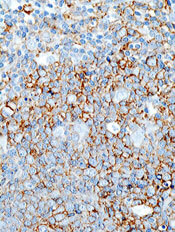User login
The European Medicines Agency (EMA) has recommended that PQR309 receive orphan drug designation for the treatment of patients with diffuse large B-cell lymphoma (DLBCL).
PQR309, is an oral, brain-penetrant, dual inhibitor of the PI3K/mTOR pathway being developed by PIQUR Therapeutics AG.
PQR309 is currently being investigated in phase 1 and 2 studies in relapsed or refractory lymphoma (NCT02249429), relapsed or refractory primary central nervous system lymphoma (NCT02669511), and other malignancies.
Preclinical research of PQR309 in lymphomas was presented at the AACR Annual Meeting 2017 (abstract 2652).
Researchers tested the drug in 40 cell lines—27 DLBCL, 10 mantle cell lymphoma, and 3 splenic marginal zone lymphoma.
The researchers reported that PQR309 had “potent antiproliferative activity” in most of the cell lines.
The median IC50 was 166 nM in DLBCL cell lines, 235 nM in mantle cell lymphoma cell lines, and 214 nM in splenic marginal zone lymphoma cell lines.
In addition, PQR309 demonstrated similar activity in activated B-cell like DLBCL and germinal center B-cell like DLBCL.
About orphan designation
Orphan designation provides regulatory and financial incentives for companies to develop and market therapies that treat life-threatening or chronically debilitating conditions affecting no more than 5 in 10,000 people in the European Union, and where no satisfactory treatment is available.
Orphan designation provides a 10-year period of marketing exclusivity if the drug receives regulatory approval. The designation also provides incentives for companies seeking protocol assistance from the EMA during the product development phase and direct access to the centralized authorization procedure.
The EMA adopts an opinion on the granting of orphan drug designation, and that opinion is submitted to the European Commission for a final decision. The European Commission typically makes a decision within 30 days. ![]()
The European Medicines Agency (EMA) has recommended that PQR309 receive orphan drug designation for the treatment of patients with diffuse large B-cell lymphoma (DLBCL).
PQR309, is an oral, brain-penetrant, dual inhibitor of the PI3K/mTOR pathway being developed by PIQUR Therapeutics AG.
PQR309 is currently being investigated in phase 1 and 2 studies in relapsed or refractory lymphoma (NCT02249429), relapsed or refractory primary central nervous system lymphoma (NCT02669511), and other malignancies.
Preclinical research of PQR309 in lymphomas was presented at the AACR Annual Meeting 2017 (abstract 2652).
Researchers tested the drug in 40 cell lines—27 DLBCL, 10 mantle cell lymphoma, and 3 splenic marginal zone lymphoma.
The researchers reported that PQR309 had “potent antiproliferative activity” in most of the cell lines.
The median IC50 was 166 nM in DLBCL cell lines, 235 nM in mantle cell lymphoma cell lines, and 214 nM in splenic marginal zone lymphoma cell lines.
In addition, PQR309 demonstrated similar activity in activated B-cell like DLBCL and germinal center B-cell like DLBCL.
About orphan designation
Orphan designation provides regulatory and financial incentives for companies to develop and market therapies that treat life-threatening or chronically debilitating conditions affecting no more than 5 in 10,000 people in the European Union, and where no satisfactory treatment is available.
Orphan designation provides a 10-year period of marketing exclusivity if the drug receives regulatory approval. The designation also provides incentives for companies seeking protocol assistance from the EMA during the product development phase and direct access to the centralized authorization procedure.
The EMA adopts an opinion on the granting of orphan drug designation, and that opinion is submitted to the European Commission for a final decision. The European Commission typically makes a decision within 30 days. ![]()
The European Medicines Agency (EMA) has recommended that PQR309 receive orphan drug designation for the treatment of patients with diffuse large B-cell lymphoma (DLBCL).
PQR309, is an oral, brain-penetrant, dual inhibitor of the PI3K/mTOR pathway being developed by PIQUR Therapeutics AG.
PQR309 is currently being investigated in phase 1 and 2 studies in relapsed or refractory lymphoma (NCT02249429), relapsed or refractory primary central nervous system lymphoma (NCT02669511), and other malignancies.
Preclinical research of PQR309 in lymphomas was presented at the AACR Annual Meeting 2017 (abstract 2652).
Researchers tested the drug in 40 cell lines—27 DLBCL, 10 mantle cell lymphoma, and 3 splenic marginal zone lymphoma.
The researchers reported that PQR309 had “potent antiproliferative activity” in most of the cell lines.
The median IC50 was 166 nM in DLBCL cell lines, 235 nM in mantle cell lymphoma cell lines, and 214 nM in splenic marginal zone lymphoma cell lines.
In addition, PQR309 demonstrated similar activity in activated B-cell like DLBCL and germinal center B-cell like DLBCL.
About orphan designation
Orphan designation provides regulatory and financial incentives for companies to develop and market therapies that treat life-threatening or chronically debilitating conditions affecting no more than 5 in 10,000 people in the European Union, and where no satisfactory treatment is available.
Orphan designation provides a 10-year period of marketing exclusivity if the drug receives regulatory approval. The designation also provides incentives for companies seeking protocol assistance from the EMA during the product development phase and direct access to the centralized authorization procedure.
The EMA adopts an opinion on the granting of orphan drug designation, and that opinion is submitted to the European Commission for a final decision. The European Commission typically makes a decision within 30 days. ![]()

